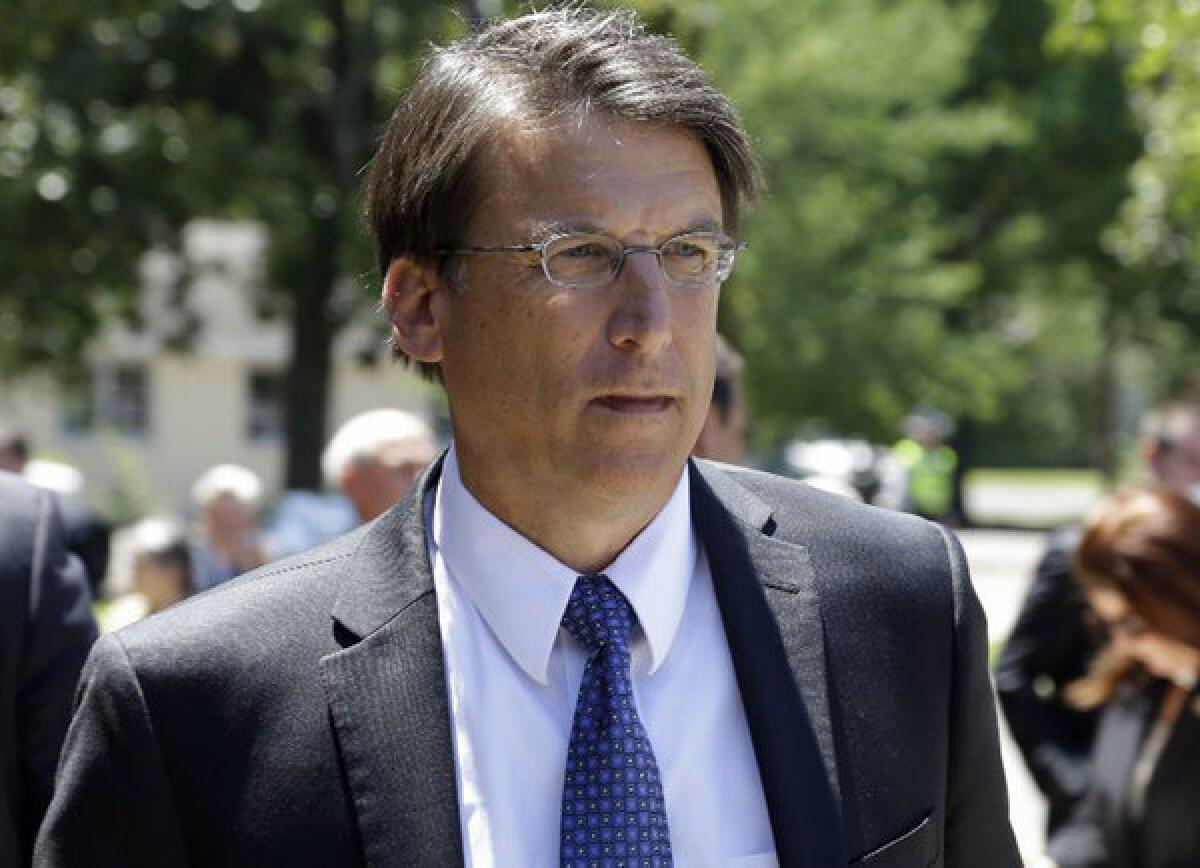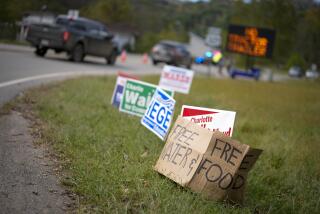North Carolinaâs governor signs sweeping voter ID bill into law

DURHAM, N.C.--One of the nationâs most restrictive voter ID bills was signed into law Monday by North Carolinaâs Gov. Pat McCrory, a Republican.
The new law requires voters to show government-issued ID cards, with polling places not allowed to accept college ID cards or out-of-state driverâs licenses. The law also shortens early voting by a week; eliminates same-day voter registration; allows any registered voter to challenge another voterâs eligibility; and ends popular preregistration for high school students.
Republicans have said the law will combat voter fraud and restore integrity to voting, but they have offered no evidence of voter fraud in the state. Civil rights groups and many independent analysts say the law is a blatant attempt to curb voting by blacks, students, the poor and other groups that tend to vote Democratic.
The law takes effect for the 2016 elections.
Civil rights groups have threatened to sue the state and Atty. Gen. Eric Holder has said the Justice Department may pursue legal challenges to voter ID laws passed by several states, including North Carolina.
North Carolina Republicans introduced the so-called Restore Confidence in Government Act after the Supreme Court struck down a key provision of the 1965 Voting Rights Act in June. The court overturned the Actâs requirement for Justice Department âpre-clearanceâ for any changes to voting laws in certain states.
Forty of North Carolinaâs 100 counties had been covered by the requirement, along with nine states and parts of several other states, mostly in the South. The provisions targeted states that had discriminated against blacks and other minorities in the past.
McCrory had been under pressure from Democrats, civil rights groups and the stateâs attorney general -- Roy Cooper, a Democrat -- to veto the bill.
âNorth Carolinians overwhelmingly support a common-sense law that requires voters to present photo identification in order to cast a ballot,â McCrory said in a statement. âCommon practices like boarding an airplane and purchasing Sudafed require photo ID, and we should expect nothing less for the protection of our right to vote.â
One of the things the law eliminates is a civics program that preregistered high school students to vote, allowing thousands to vote before their 18th birthday. When asked at a July 26 news conference how that combats voter fraud, McCrory said he could not answer because he had not read the bill.
The law also weakens disclosure requirements designed to identify who pays for campaign ads. It allows unlimited corporate donations to political parties and raises the cap on individual campaign donations from $4,000 to $5,000.
Neither McCrory nor Republican legislators have explained how those measures help guard against voter fraud.
The state chapter of the NAACP has called the law âa poll tax dressed up in new clothes.â
After the bill was signed Monday, the chapter issued a statement: âTheir [Republicans] direct attempts to suppress the civil rights of black people in North Carolina and secure power through manipulation of the electorate are the ultimate crimes against democracy.ââ
One state study estimated that at least 318,000 registered North Carolina voters do not have driverâs licenses or state-issued ID cards. Many are elderly, low-income or African American -- groups that tend to vote for Democrats.
Democrats made up more than 60% of early voters in the state in 2012.
Blacks represented 22% of North Carolinaâs registered voters in 2012 but accounted for 34% of voters without driverâs licenses, according to Democracy North Carolina, a liberal advocacy group. It says blacks in 2012 made up 29% of North Carolinaâs early voters and 34% of same-day registration voters.
Democrats are among the voters most likely to use straight-ticket voting. The new law eliminates straight-ticket voting, which had been in place in North Carolina since since 1925.
ALSO:
Bloomberg blasts ruling against NYPDâs stop-and-frisks
âWhiteyâ Bulger guilty in gangland slaying-racketeering case
Tennessee judge, citing Jesus, changes babyâs name from âMessiahâ
Twitter: @davidzucchino
More to Read
Sign up for Essential California
The most important California stories and recommendations in your inbox every morning.
You may occasionally receive promotional content from the Los Angeles Times.











